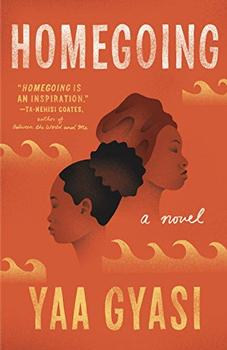Summary | Excerpt | Reading Guide | Reviews | Beyond the Book | Read-Alikes | Genres & Themes | Author Bio

This article relates to Homegoing
Homegoing is set against the backdrop of the Gold Coast slave trade. Protagonists Efii and Esi, the two half-sisters, come from warring states in 18th century Ghana, the Ashantis and the Fantes.
 The Ashanti Nation was a loose group of fiefdoms, an ethnic subgroup that was formed in 17th century Ghana as a trading coalition with the Europeans. The foreigners, mostly Portuguese, were initially most interested in the gold ore — hence the subsequent name, Gold Coast. While the beginnings of the Ashanti (also spelled Ashante) were not very rigid, it was consolidated by the leader Osei Tutu who created a constitution and installed a seat of power in Kumasi. Osei Tutu served as defacto king and the region's most important natural resource, gold, was declared a royal possession. The Ashantis consolidated power in the region by trading the gold in exchange for other goods and firearms which, in turn, helped strengthen their hold especially as they battled with other nation states, such as Fanteland, for power.
The Ashanti Nation was a loose group of fiefdoms, an ethnic subgroup that was formed in 17th century Ghana as a trading coalition with the Europeans. The foreigners, mostly Portuguese, were initially most interested in the gold ore — hence the subsequent name, Gold Coast. While the beginnings of the Ashanti (also spelled Ashante) were not very rigid, it was consolidated by the leader Osei Tutu who created a constitution and installed a seat of power in Kumasi. Osei Tutu served as defacto king and the region's most important natural resource, gold, was declared a royal possession. The Ashantis consolidated power in the region by trading the gold in exchange for other goods and firearms which, in turn, helped strengthen their hold especially as they battled with other nation states, such as Fanteland, for power.
By the 1800s, the focus had shifted significantly to the trading of slaves to European countries and America. The Ashanti nation, by virtue of its growing power, was a principal supplier, with the slaves being recruited from states they won battles against. One of the country's most visible outposts of the slave trade is the Cape Coast Castle, which features in Homegoing as the castle where Effia enjoys the lap of luxury while her half-sister is trapped in the dungeons underneath. The Cape Coast Castle was one of many trading outposts, but its dark history as the last African stop in a global slave trade makes it a sobering tourism destination these days.
 It is estimated that roughly 6.3 million slaves were shipped from West Africa to North America and South America, about 4.5 million of that number between 1701 and 1810. Perhaps 5,000 a year were shipped from the Gold Coast alone.
It is estimated that roughly 6.3 million slaves were shipped from West Africa to North America and South America, about 4.5 million of that number between 1701 and 1810. Perhaps 5,000 a year were shipped from the Gold Coast alone.
Ironically, the British, with whom the Ashanti were partners in the slave trade, became their chief adversaries and after many failed encroachments, conquered the land in the early twentieth century. Ghana eventually gained independence from the British in 1956.
In an op-ed in The New York Times, famous African American historian Henry Louis Gates Jr. wrote: "the sad truth is that without complex business partnerships between African elites and European traders and commercial agents, the slave trade to the New World would have been impossible, at least on the scale it occurred."
Cape Coast Castle
Cape Coast Castle Dungeon
Filed under Places, Cultures & Identities
![]() This "beyond the book article" relates to Homegoing. It originally ran in June 2016 and has been updated for the
May 2017 paperback edition.
Go to magazine.
This "beyond the book article" relates to Homegoing. It originally ran in June 2016 and has been updated for the
May 2017 paperback edition.
Go to magazine.
Believe those who are seeking the truth. Doubt those who find it.
Click Here to find out who said this, as well as discovering other famous literary quotes!
Your guide toexceptional books
BookBrowse seeks out and recommends the best in contemporary fiction and nonfiction—books that not only engage and entertain but also deepen our understanding of ourselves and the world around us.